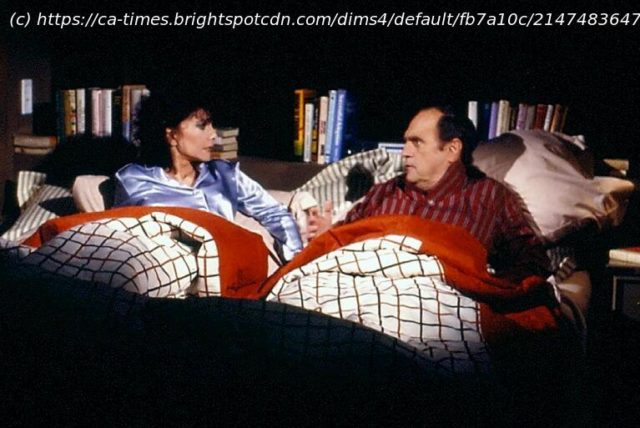Bob Newhart, who died Thursday, was outwardly, if deceptively, the picture of midcentury American normalcy — a blank canvas on which he painted his characters.
The nice thing would be to wake up and find oneself in bed in a Chicago apartment between Bob and Emily, or in a Vermont inn with Dick and Joanna, and find that this was all a dream. Sadly, the world doesn’t work that way. Bob Newhart has left the stage for the last time, and the dream is over.
Newhart, who died Thursday at the age of 94, was a quiet comic giant whose sneaky genius ruled comedy across seven decades and whose name was attached to four fine sitcoms — “The Bob Newhart Show,” “Newhart,” “Bob” and “George and Leo,” his actual first name being George — and a drinking game, “Hi, Bob.” (Pardon me while I sip.)
After a brief, unsuccessful stint selling taped comic routines to radio stations, his first album, “The Button-Down Mind of Bob Newhart,” recorded in 1960 at his first ever public performance, was massively, historically successful: It reached No. 1 on the Billboard charts and won Grammys for album of the year and best new artist. When its follow-up, “The Button-Down Mind Strikes Back!,” was released six months later, Newhart found himself with the No. 1 and No. 2 records in the country.
In the early 1960s, comics did not tell you about themselves the way they do now; authenticity was not a quality comedy prized. They worked behind created personas, or they presented little playlets — this was as true of Lenny Bruce as it was of Nichols and May or Shelley Berman (who, like Newhart, employed the one-sided phone conversation). They might show you who they were by the way they processed the world into a routine; Newhart estimated that his character “is about 85% me, the other 15% being an extremely … sick mind that enjoys the macabre.” But they wouldn’t draw you a picture.
There is no “I” in Newhart’s classic stand-up, past “I was reading in the paper today” or “I think it might go something like this.” About all you could learn about him from his stage act is that he was from Chicago, worked as an accountant (“I had a kind of strange theory of accountancy — if you got within two or three bucks of it … but it never caught on”) and had a job in the unemployment office until he realized he made only $10 more than his clients, “and they only had to come in once a week.”
Newhart was outwardly, if deceptively, the picture of midcentury American crew-cut, suit-and-tie normalcy — a blank canvas on which he painted his characters.
Home
United States
USA — Art Bob Newhart was a timeless comedic genius whose quiet delivery made him...






